Quarantine Scapegoats: three top bureaucrats singled out over debacle that lead to 768 deaths
Victoria’s hotel quarantine inquiry has been urged to find that public service chiefs failed to keep Premier, ministers informed.
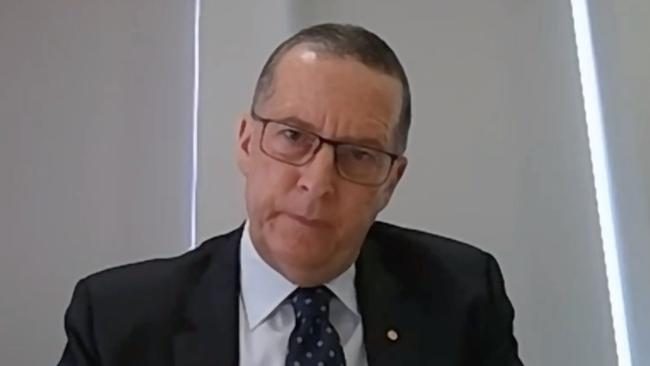
Victoria’s hotel quarantine inquiry has been urged to find public service chiefs failed to keep Daniel Andrews and key ministers informed about major problems in the state’s quarantine regime which sparked a second-wave outbreak that claimed 768 lives and infected more than 18,000 people.
Counsel assisting the inquiry, Ben Ihle, laid out a litany of adverse recommendations and said there was an “inexplicable oversight in relation to important information” about the program.
In the final statements before the inquiry, Mr Ihle and the other counsels assisting — Tony Neal QC and Rachel Ellyard — said it was clear the program had “failed to meet its primary objective to keep us safe from the virus”.
A cloud now hangs over the immediate futures of the three public servants — Department of Premier and Cabinet secretary Chris Eccles, Department of Health and Human Services secretary Kym Peake and Department of Jobs secretary Simon Phemister.
“In our submission, these matters tend to demonstrate (an) attitude to transparency and accountability that likely manifest in its practices that contributed to problems within the hotel quarantine program,” Mr Ihle said.
“We do invite you to find that the offers of assistance made or available to be made to Victoria by the ADF should have been raised with the Premier, thinking particularly about the apparent availability of inclined personnel in early April,” Ms Ellyard said.
Counsels assisting stopped short of making any adverse recommendations against the Victorian Premier, Jobs Minister Martin Pakula and former health minister Jenny Mikakos.
In particular, Mr Ihle said there was no evidence Mr Eccles had alerted Mr Andrews to offers of Australian Defence Force help.
However, Mr Andrews, in a March 27 press conference following national cabinet, noted he was “very grateful to (Scott Morrison) for his offer of support from the Australian Defence Force”.
“It has also been agreed that the Australian Defence Force will be engaged to support the implementation of these arrangements,” a separate statement on the day, attributed to Mr Andrews, reads.
Mr Andrews has subsequently said he “did not understand, on the basis of the meeting, that Victoria would be receiving extensive ADF support in its implementation of the decision (to quarantine arrivals in hotels)”. Presenting proposed findings to the inquiry’s chairwoman, former Family Court judge Jennifer Coate, counsels assisting said rather than protecting Victoria, the program “was instead a seeding ground for the spread of COVID-19 into the community”.
“One only needs to pause and to reflect on those figures to appreciate the full scope of devastation and despair occasioned as a result of the outbreak,” they said.
Nearly all of Victoria’s second-wave coronavirus cases have been linked to infection-control breaches at the Rydges on Swanston and the Stamford Plaza.
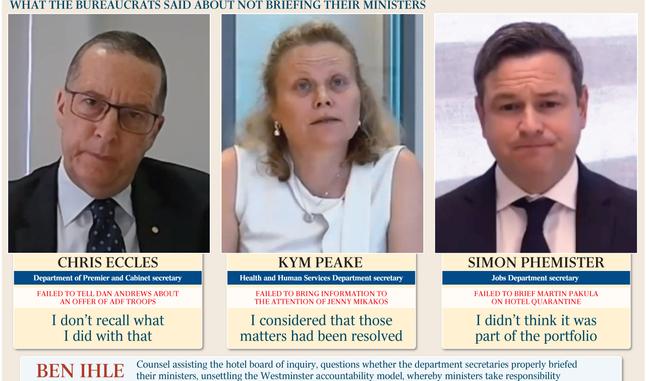
The commonwealth made a number of offers after March 27, including one relayed to Mr Eccles from Department of Prime Minister and Cabinet secretary Phil Gaetjens on April 8.
Mr Eccles told the inquiry he did not remember informing Mr Andrews of the offer of ADF support, while the Premier said he didn’t recall hearing about it.
Mr Eccles is a highly distinguished public servant, having served at the top of echelons of both the South Australian and NSW bureaucracies prior to becoming secretary of the Department of Premier and Cabinet in Victoria in 2014.
He was chief executive of the South Australian Department of the Premier and Cabinet from 2009 to 2011 and was director-general of the NSW Department of Premier and Cabinet from 2011 to 2014.
In 2017, Mr Eccles was made an Officer of the Order of Australia “for distinguished service to public administration, to innovative policy development and sound governance, and to the delivery of reform in the areas of training, education and disability’’.
Ms Ellyard did not criticise the decision not to use the ADF in the early days of the program, but said troops may have been better equipped for infection control.
In the case of Ms Peake, Mr Ihle said her failure to brief Ms Mikakos appeared to be “the deliberate and conscious decision to not inform the minister of an issue which is of significance falling within the minister’s portfolio”.
Ms Mikakos quit government on Saturday following testimony given by Mr Andrews in which he laid blame for the hotel quarantine program with her and her department.
Ms Ellyard told the inquiry that Mr Phemister should have consulted Mr Pakula on security contracts being entered into on behalf of the state government.
She said given the importance of ensuring the coronavirus did not breach hotel quarantine, Mr Pakula should have at least been consulted before the infection-control responsibility was outsourced to private companies.
“It wasn’t the standard to be applied in relation to the outsourcing of substantial components of a quarantine system that was designed to prevent the spread of this virus into the community,” she said.
“It shouldn’t have happened without appropriate ministerial consultation and knowledge, it shouldn’t have happened without appropriate consideration at the highest levels of the department.”
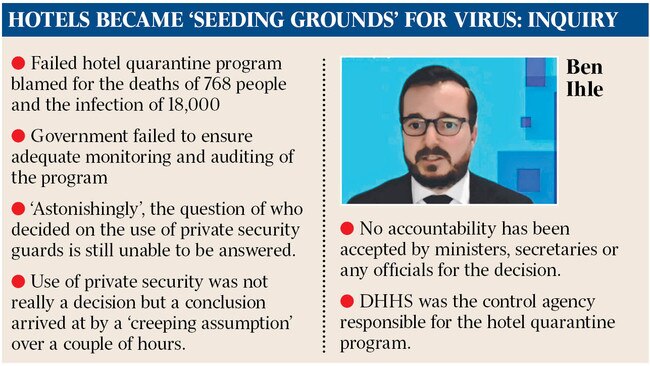
Mr Phemister told the inquiry he didn’t brief Mr Pakula on the details of the contracts because he himself did not have that detailed level of knowledge, while the Jobs Minister said ministers weren’t usually briefed on contracts before they were signed.
Ms Ellyard proposed the board of inquiry find managing infection control should have remained with the Victorian government, instead of being contracted out to security guards.
She also said using private security at hotel quarantine was a “creeping assumption that became reality” instead of a conscious decision, in what she labelled a “failure of decision making”. “It follows from no one being the decision maker that there is no evidence that any one person or group of people actually turned their mind to whether it was appropriate to rely so heavily on private security.”
“It was a creeping assumption that became the reality and the absence of clarity, certainty and active engagement with that question on whether it was appropriate or not has to be understood as a failure of decision-making,” Ms Ellyard said.
Ms Ellyard noted hotel quarantine was not “a sporting event”.
She said the consensus to use private security was reached at a meeting between agencies at 4.30pm on March 27 where Victoria Police Assistant Commissioner Mitch Grainger expressed a preference for private security be used.
“Their preference became the outcome,” she said.
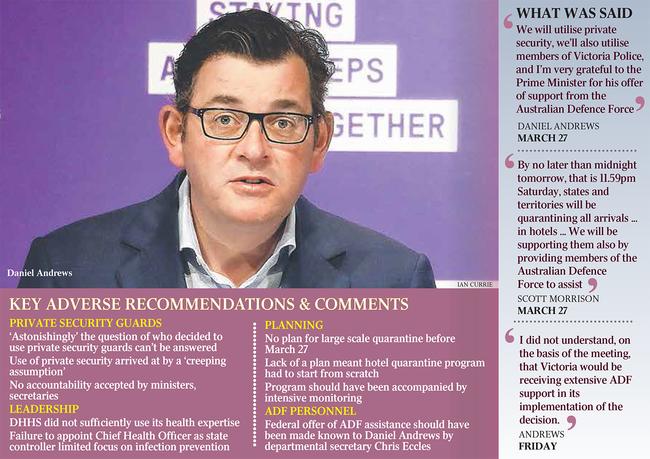
Ms Ellyard noted that no minister or senior bureaucrat had accepted accountability for the use of private security and there was no suggestion of any risks with private security.
She said the Department of Health and Human Services was clearly the lead agency over hotel quarantine under the relevant legislation, but key bureaucrats hadn’t understood what performing that meant in the context of managing an emergency.
“It is in that context that we submit to you that DHHS didn’t understand its control ¬agency function and didn’t properly perform it, notwithstanding the great deal of work that was done by a great many people,” she said.
In his opening remarks, Mr Neal said on the evidence before the inquiry it seemed no had acted in “bad faith or corruption”.
Whether the ADF was available for the quarantine program has been a matter of intense debate between Mr Andrews and key state officials and the federal government.
In August, Victorian Emergency Management Commissioner Andrew Crisp said the ADF had not been offered. A day earlier Defence Minister Linda Reynolds said defence officials had “asked whether Victorian authorities required assistance … on multiple occasions”.
More Coverage
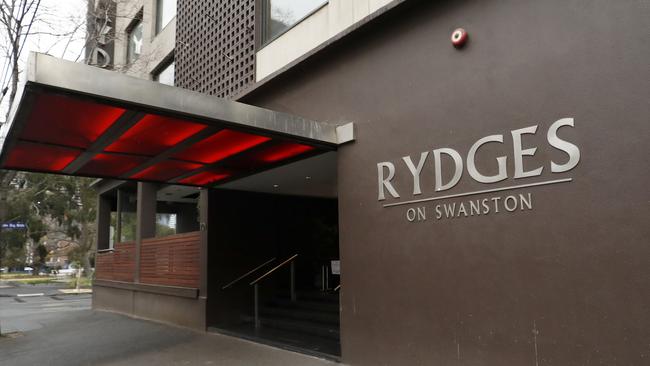

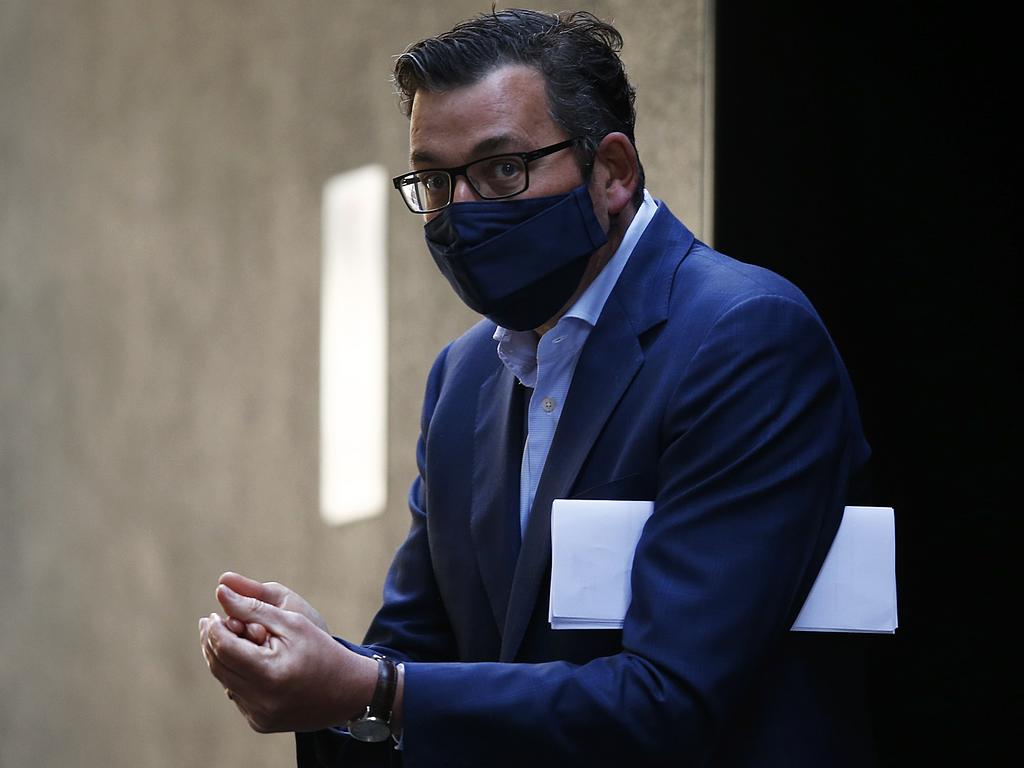





To join the conversation, please log in. Don't have an account? Register
Join the conversation, you are commenting as Logout